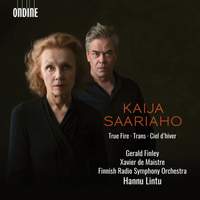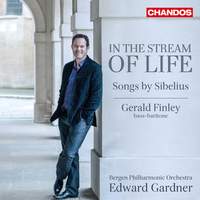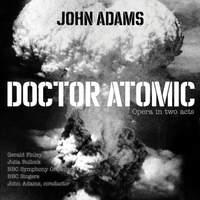Interview,
Gerald Finley on Kaija Saariaho's True Fire
 Premiered by its dedicatee Gerald Finley and co-commissioners the Los Angeles Philharmonic under Gustavo Dudamel in 2015, the Finnish composer Kaija Saariaho’s 25-minute song-cycle True Fire sets texts by Seamus Heaney, Ralph Waldo Emerson and Mahmoud Darwish which explore man’s connections with nature. The Canadian bass-baritone has a strong affinity with Finnish music, having been shortlisted for a Gramophone Award for In the Stream of Life, his 2016 recording of Sibelius songs in orchestrations by the late Einojuhani Rautavaara; I spoke to him about his long-standing friendship with Saariaho, the process of bringing the piece to life, and his own relationship with the Finnish landscape.
Premiered by its dedicatee Gerald Finley and co-commissioners the Los Angeles Philharmonic under Gustavo Dudamel in 2015, the Finnish composer Kaija Saariaho’s 25-minute song-cycle True Fire sets texts by Seamus Heaney, Ralph Waldo Emerson and Mahmoud Darwish which explore man’s connections with nature. The Canadian bass-baritone has a strong affinity with Finnish music, having been shortlisted for a Gramophone Award for In the Stream of Life, his 2016 recording of Sibelius songs in orchestrations by the late Einojuhani Rautavaara; I spoke to him about his long-standing friendship with Saariaho, the process of bringing the piece to life, and his own relationship with the Finnish landscape.
How did your first meeting with the composer come about, and how has your relationship developed since then?
I actually met Kaija when I sang in the premiere performances of L’amour de loin in Paris in October 2001. I then did performances in Santa Fe and London. She extracted music from the opera into a piece for orchestra called Reflets de L’amour de loin which I premiered in Stockholm and then we met in Helsinki for the performances and DVD recording. It was a wonderful way to get to know her and her music over a few short years. Since then we have looked for opportunities to collaborate which finally came as True Fire.
Do you see any common ground between L’amour de loin and True Fire, either in terms of the vocal writing or the orchestration?
There are many moments in True Fire which remind me of L’amour. The opening recalls the first scene of the opera when Jaufré the troubador is searching for meaning. In fact, True Fire is really a search and poetic overview of a composer’s challenge and it is apt that moments from the opera surface throughout the later piece.
What was your working process like for the new cycle: is Kaija someone who prefers to work in isolation until a score is complete, or did you have input during its genesis?
Kaija was searching for texts in English which she felt would honour our relationship and offer me a good vocal opportunity. She liked my English and American song recordings and wanted to use my sense of singing text to a great degree. At one point we considered food recipes! I trusted her completely, having heard her write for voice, specifically Dawn Upshaw, and there was always a very confident and personal element to those works. I was completely delighted with the score as soon as it arrived. We didn’t change one thing.
A couple of years ago you recorded a selection of Sibelius songs in new orchestrations by Einojuhani Rautavaara – does Finnish music hold a special fascination for you, and do you see any kinship between Saariaho’s work and the music of Rautavaara and ultimately Sibelius?
I first sang Sibelius as a young singer and was immediately taken by the subject matter and somewhat stark musical settings. When I first visited Finland in about 1989, I was astonished to discover that the geology and topography, not to mention the climate and forest cover, was extremely akin to my Canadian homeland. It felt very familiar to be in that physical environment. The music has also seemed to be very accessible.
A technical question: are the ‘ssshh’-ing sounds in the fourth-movement Lullaby a vocal or orchestral effect?
They are vocal effects!
You’ve created major roles in several new operas over the course of your career, including Adams’s Doctor Atomic and Harry Heegan in Mark-Antony Turnage’s The Silver Tassie: what do you most enjoy about working on a score from scratch, and do you have any other premieres in the pipeline that you can discuss yet?
I always try to make sure that every piece of music I am involved with is treated as a ‘premiere’. Not that I disregard other performances, but that I want to experience the score directly and see if I can create my own relationship with it, and offer my voice to what the composer seems to ask. Of course, queries to living composers are usually answered! The creative process can be very invigorating. Not only operas but lovely song works have come my way: Peter Lieberson’s Songs of Love and Sorrow, Huw Watkins's Lunar Cycle, Mark Anthony Turnage’s Torn Fields, and When I woke, and Julian Phillip’s Goodison Quartet. I am happy to say that there are new projects ahead that will be very invigorating!
Bryn Terfel recently told us that one of his dreams is to commission and star in a new opera based on either Frankenstein or Citizen Kane – if you were given carte blanche to commission a song-cycle or staged work for yourself, what would your subject-matter be?
I always thought that Lorenzo da Ponte’s life was worth an opera, and I am delighted to see it now exists as Phoenix by Tarik O’Regan.
I wondered too if Salinger’s Catcher in the Rye might be edgy for an opera, though I’m getting beyond credibility for the main character, Holden Caulfield. I think the first Moon landing could evoke some reflection through poetic song cycle. I have been thinking recently that great paintings could spawn either song or stage works. I think the mysterious death of Canadian painter Tom Thomson could be a good subject. Lots!
Gerald Finley (bass-baritone), Xavier de Maistre (harp); Finnish Radio Symphony Orchestra, Hannu Lintu
Available Formats: CD, MP3, FLAC, Hi-Res FLAC
Other recordings referenced in this article
Gerald Finley (bass-baritone), Bergen Philharmonic Orchestra, Edward Gardner
Available Formats: SACD, MP3, FLAC, Hi-Res FLAC
Gerald Finley (Robert Oppenheimer), Julia Bullock (Kitty Oppenheimer), Brindley Sherratt (Edward Teller), Samuel Sakker (James Nolan), Andrew Staples (Robert Wilson), Jennifer Johnston (Pasqualita)
BBC Singers, BBC Symphony Orchestra, John Adams
Available Formats: MP3, FLAC, Hi-Res FLAC





